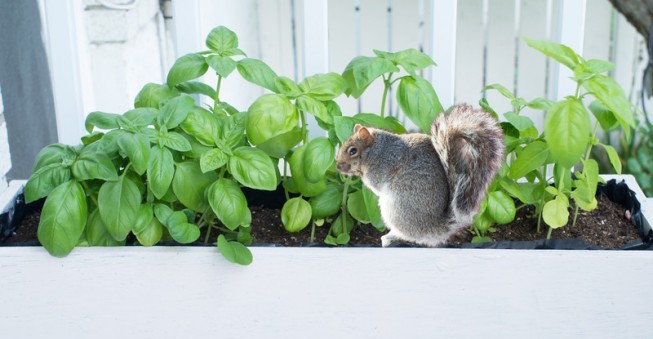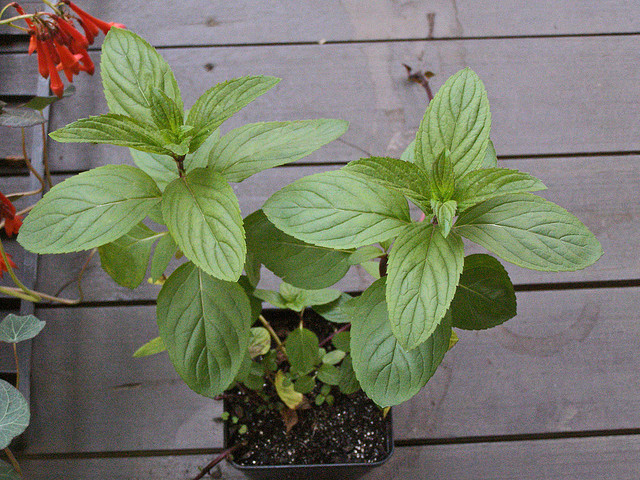How To Keep Squirrels Out Of Your Garden

From a distance, squirrels can be entertaining and cute, especially when you watch them jumping from one place to another. However, in the garden it’s a whole different story. All too often gardeners come back to find their tomatoes chewed up and flower beds dug up. This guy seems to be interested in fresh basil.
Squirrels are a frustrating garden pest because they are fast, and never travel alone. They will target many different parts of the garden, including seedlings, flowers, berries, flower buds, bulbs and seeds.
While a single squirrel might not cause too many problems, if you start getting multiple squirrels as visitors they can quickly cause irreparable damage to the plants you’ve worked so hard to grow.
Having squirrels in your garden can be frustrating, but there are multiple different approaches that you can try to keep them off your plants and even out of your garden altogether.
Make Your Garden Less Yummy
Squirrels are often attracted to gardens by the smell of seeds, nuts or fresh fruit. Cleaning these up regularly is an important step for making your garden less appealing and reducing the potential for any squirrel visitors.
While you might not to base your plant choice around squirrels, including a few species in the mix that squirrels don’t like can also help to make your garden less welcoming for them overall.
In some cases this can be enough to make the squirrels look for other places to eat. This is especially true if you are also taking a multi-prong approach using some of the other ideas from below. Some key species that squirrels aren’t fond of include foxglove, blanket flowers, dahlia, bee balm and coneflowers.
Another way to make the garden less appealing is through taste. Both home-made and store-bought repellants can be used to make plants taste bad to squirrels. You might still get squirrels coming to visit at first, but they quickly lean that the garden isn’t to their taste.
Typically you would spray repellants onto the plants themselves using a spray bottle. This spray has to be reapplied at least once a week as well as after rain. Additionally, repellants work best on ornamental plants, rather than fruits and vegetables. Jalapeños, garlic, vinegar, and especially peppermint are well known deterrents.
Having your garden smell like candy canes wouldn’t be so bad! Hey, maybe planing some peppermint or any mint plants would work too.
Scare Them Off (Obviously)
There are a few different ways to scare squirrels away from your garden. The simplest approach is to give a dog or a cat free reign, especially if you teach the pet to chase after squirrels. This is a bummer if your dog freaks out every time a squirrel gets in the yard though.
If you don’t have a pet, using predator urine on the borders of your garden is another possibility. Yeah, it’s a real thing you can buy!
The scent is terrifying to many species with major predators and spray-on varieties are common. Once again though, you will need to re-spray regularly, especially after rain.
Pinwheels or hanging compact disks are another possible tactic for scaring of squirrels. These spin in the wind, often changing colors and giving off glare. Squirrels will get use to these over time, but it may keep your plants safe long enough for them to stop being vulnerable.
Other tips I read about include things like high-frequency sound emitters or motion-sensitive lights (although the latter is most relevant at night). These can be good ways of scaring squirrels off. If you change things up regularly there is a good chance that you can keep squirrels at bay for quite a while, if not indefinitely. As with most animals, they learn…albeit there is probably less of a chance of this happening than with a naughty dog or a curious deer.
Motion Sensor Sprinklers
One thing that’s been highly effective for me and my battle with cats has been motion sensor sprinklers. They can detect even small animals when put on high sensitivity, and will scare the heck out of anything (even humans!).
Water is harmless, and it can sure be satisfying to see the critters run after all the damage they’ve been doing to your precious plants and veggies.
All you need is a nearby hose to connect. You can even add a timer to your spigot, and have it run automatically turn on at night, then off during the day. Better models like the Orbit Yard Enforcer actually have an option to choose night, day, or both so you won’t need the extra timer.
In the video you’ll see one called the Contech Scarecrow. I own this one, but for some reason the price has really gone up recently so the Orbit is a better buy.
Keeping Them Out
Fences to keep squirrels out of your garden would be an expensive and complicated approach. After all, squirrels are particularly good at climbing and at getting anywhere they want to go. However, this doesn’t stop you from keeping the away from specific plants.
Keeping squirrels out works best for small plants and for flower bulbs. When plants are small or newly planted they are the most vulnerable to squirrels and their small size makes it easier to set up a barrier.
You can create a mesh cage using chicken wire or hardware mesh. Because squirrels are agile, you need to make sure this mesh closes at the top. When setting up the mesh, you need to leave enough room for the plants to grow, although you can choose to take it off again once the plants are less vulnerable to permanent damage.
With a bit more work you can also create more permanent structures that exclude squirrels entirely. For example, one way of doing this would be to create a wooden frame covered in some form of mesh. Theoretically, this could be as big as needed and some people do make this type of barrier big enough for entire garden beds. Although at this point, you might as well build a mini greenhouse.
What’s worked for you and what hasn’t so far? Tell us your squirrel stories!
Categorised in: Animals

